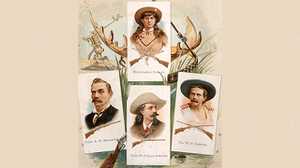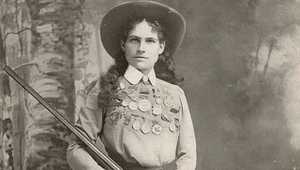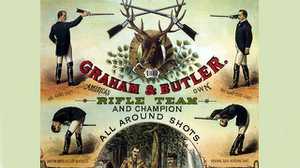Annie Oakley in Europe
She was a product of small town America, and Annie Oakley had never been to Europe before she traveled across the Atlantic with Buffalo Bill Cody's troupe in 1887. But it was her time abroad that helped make Oakley a star at home.

The London Exposition
Oakley had been with Buffalo Bill's Wild West show for fewer than two years when she and Cody set off for London in late March 1887. Along with Oakley, Cody brought 180 horses, a Western stagecoach, 18 buffalo, and 97 Indians, many of whom dreaded any passage over "the Big Water."
Buffalo Bill was off to "show the effete Europeans just what real life in America is like," the New York Times said, and after a stormy crossing, Cody's Wild West received a tremendous reception in England. The show was one of several playing in commemoration of Queen Victoria's Golden Jubilee, and more than two and a half million people came to see it, including Edward, the Prince of Wales, and the Queen herself, who almost never ventured out in public. "All the world and his wife were there," one newspaper reported of the May 9 opening -- the show "was on every tongue," another said. And the papers lavished praise on Oakley, saying "the loudest applause of the night" was reserved for her and declaring her "far and away" the show's best marksman. Even Queen Victoria chimed in. "You are a very, very clever little girl," Her Majesty said.

A Rivalry and Growing Celebrity
A rivalry emerged during the London engagement — Annie competed for attention with a 15-year-old sure shot from California named Lillian Smith. One British newspaper also noted Oakley's "charming naiveté" in shaking the hand of Prince Edward's wife first, even though it had been a deliberate decision by Oakley, who disliked Edward's flirtatiousness. Oakley left Cody's show at the end of its London run and returned to America. But her reputation was growing by leaps and bounds — a new novel about her, The Rifle Queen, had just appeared, featuring outlandish tales and many made-up adventures.
Back to Europe
Lillian Smith's departure from Cody's show helped Oakley and Buffalo Bill smooth things over, and in early 1889 she rejoined the Wild West in time for a new trip to Europe. This time the destination was the Paris Exposition, an event commemorating the 100th anniversary of the French Revolution. Some 32 million people visited the Exposition, and Cody's "Buffalodrum" was a clear highlight. At the beginning Oakley had to win over French audiences – the first crowd of 20,000 "sat like icebergs," she recalled, and initially it looked like the only ones who would applaud were "clackers" hired for that purpose. But Oakley had her husband Frank Butler send them away, and by the end of her act, the audience cheered and threw their hats into the air. From that point on, Oakley had no trouble at all, and her performances drew such acclaim that the president of France offered her a commission in the French army, and the king of Senegal said he would buy her for 100,000 francs. Oakley declined, at which point the monarch fell to his knees, kissed her hand, and left.

Adventures and Stardom
The Paris Exposition served as the springboard for a tour of Europe that lasted until late 1892. Butler and Oakley had an audience with the Pope, survived a bout of Spanish flu in Barcelona that killed the show's announcer, visited Venice and southern France, and saved a prince's life in Munich. It happened when a bronco broke loose from its cowboy handler and headed for Prince Luitpold of Bavaria, who thought it was all part of the act. Annie tackled him, saving the prince's life, and later remarked that she "was the only person alive that ever knocked a ruling sovereign down and got away with it." There is another famous story from this tour that Oakley, according to a nephew, explicitly denied. The story goes that German Prince Wilhelm had seen Oakley shoot a cigarette from Butler's mouth and wanted the stunt repeated while he held it. It goes that after shifting the cigarette to the future Kaiser's hand, Annie nipped the ashes right off it. When the story appeared in the papers after the war had begun, Oakley and Butler, apparently taking advantage of the publicity, endorsed it, and Oakley would later remark that a miss on that occasion might have averted World War I. On October 27, 1892, Annie Oakley returned to New York, where the newspapers were lined up to interview her. She had become a superstar.







